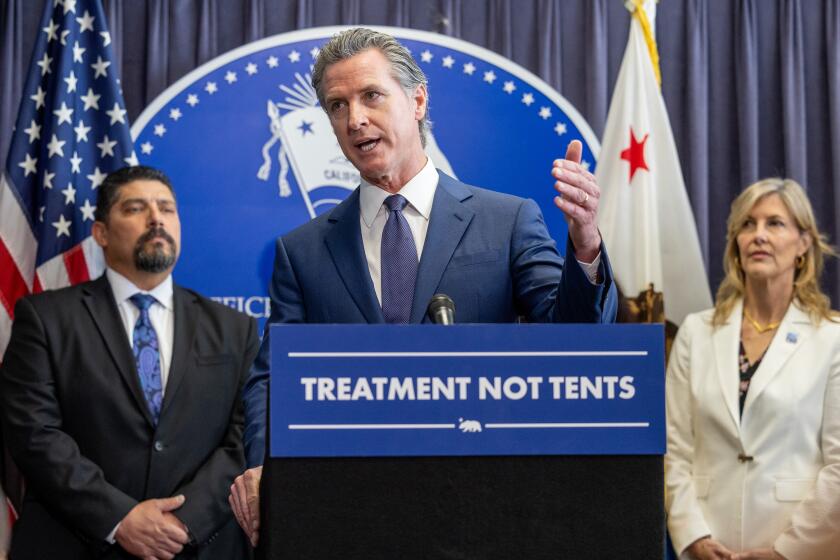From Syria, Pelosi is making waves
House Speaker Nancy Pelosi held a widely anticipated meeting with Syrian President Bashar Assad on Wednesday, bringing with her a message that Israeli leaders were open to renewing long-dormant peace negotiations, and drawing intensified criticism from the Bush administration and its allies.
The meeting was the highest-level contact between the U.S. and Syrian governments in four years and the latest in a series of moves by congressional Democrats to force the White House toward a new course in the region. Her visit comes less than two weeks after passage of legislation that would force the White House to begin the withdrawal of American troops from Iraq.
Televised images of Pelosi, who is second in line to the U.S. presidency, and Assad were broadcast repeatedly across the Middle East and in the United States. The San Francisco Democrat’s visits to markets and mosques offered viewers across the Middle East a contrast to the Bush administration’s hard-line stance.
The Assad government seized on the visit as an opportunity to renew bilateral talks between the two countries and to criticize the Bush administration’s policy of trying to isolate the Syrian regime.
“These people in the United States who are opposing dialogue, I tell them one thing: Dialogue is ... the only method to close the gap existing between two countries,” said Syrian Foreign Minister Walid Moallem. “We are happy that Mrs. Pelosi and her delegation had the courage and determination to bridge these differences.”
Pelosi emerged from the meeting with Assad saying in a televised news conference that she had pressed him on Syria’s support for the Islamic militant group Hamas and Lebanon’s Hezbollah militia, both of which are on the U.S. State Department’s list of terrorist groups.
But she also stressed a desire for direct talks with the Syrian government, a position that contrasts sharply with the administration’s policy. “We came in friendship, hope, and determined that the road to Damascus is a road to peace,” Pelosi said.
The White House and conservative critics seized on the comment about the road to Damascus to ratchet up their criticism of Pelosi.
“Unfortunately, that road is lined with the victims of Hamas and Hezbollah, and the victims of terrorists who cross from Syria into Iraq,” said Gordon Johndroe, a White House spokesman traveling with President Bush to California. “It’s lined with the victims in Lebanon, who are trying to fight for democracy there; it’s lined with human rights activists trying for freedom and democracy in Syria.”
The rhetoric was notably sharper than Bush’s comment ahead of the meeting in which he called Pelosi’s initiative “counterproductive.”
Pelosi’s comments also sparked a flurry of statements in Israel. The speaker met over the weekend with Israeli Prime Minister Ehud Olmert and brought a message from him. At her news conference, she said that Assad was “ready to engage in negotiations for peace with Israel.” Her language prompted speculation that Olmert had changed Israel’s stance on the conditions under which it would hold talks with Damascus.
Olmert’s office quickly released a statement after Pelosi’s remarks, reiterating his position that Syria must first renounce support for Hamas and Hezbollah, a condition Israelis believe would be difficult for Assad to accept.
“The prime minister emphasized [to Pelosi] that although Israel is interested in peace with Syria, that country continues to be part of the axis of evil and a force that encourages terror in the entire Middle East,” the statement said, recounting Olmert’s meeting with Pelosi over the weekend.
Pelosi has described her meeting with Assad as an attempt to breathe new life into recommendations made by the Iraq Study Group, the blue-ribbon U.S. commission that counseled talks with both Syria and Iran to address the conflict in neighboring Iraq.
One member of Pelosi’s delegation, California Rep. Tom Lantos (D-Burlingame), chairman of the House Foreign Affairs Committee and a leading critic of authoritarian Arab regimes, added that their discussions reinforced a need for the administration to engage with Syria on regional issues. Talks have been on hold since the U.S. withdrew its ambassador in 2005 after the assassination of former Lebanese Prime Minister Rafik Hariri, a killing that U.N. investigators have tied to Damascus.
“This is only the beginning of our constructive dialogue with Syria, and we hope to build on this visit,” Lantos said.
The delegation included four other Democrats -- Reps. Henry A. Waxman of Los Angeles, Nick J. Rahall II of West Virginia, Louise M. Slaughter of New York and Keith Ellison of Minnesota, the first Muslim elected to Congress -- and one Republican, David L. Hobson of Ohio.
Pelosi’s defenders have noted that other congressional delegations have met with Assad in recent months, including a group of Republican lawmakers who made the trip to Damascus last week. But some Republicans argued that her position as speaker made the meeting symbolically more important for the Syrians.
Vice President Dick Cheney criticized Pelosi for offering Assad important support. “In other words, his bad behavior is being rewarded,” Cheney said.
Some conservative groups were even more critical. The prominent Family Research Council disapproved of Pelosi for consenting to the Islamic custom of covering her head during a visit to a mosque. The group said doing so “is usually seen as a sign of submission in the Muslim world.” U.S. Secretary of State Condoleezza Rice and First Lady Laura Bush are among many high-profile women who do the same when in the Mideast.
Olmert’s decision to ask Pelosi to deliver the Israelis’ message on putative peace talks generated the most confusion in the region.
The Israeli prime minister’s request came amid international pressure to respond positively to a Saudi Arabian initiative to restart negotiations on a peace deal with the Palestinian Authority. On Sunday, Olmert invited Arab leaders to meet with him to exchange ideas about how to resolve the Israeli-Palestinian conflict.
According to accounts in Israeli media, the message Pelosi was to deliver was that Syria was welcome to join this diplomatic effort if Assad dropped his support for terrorism. Possibly more important, Olmert also wanted to bolster public assurances that Israel had no intention of attacking Syria militarily, as Syrian officials may have feared, according to media reports.
The Israeli newspaper Haaretz said Olmert decided to underscore that point by asking Pelosi to deliver “a message of calm from Israel.”
*
boudreaux@latimes.com
Spiegel reported from Washington and Boudreaux from Jerusalem.
More to Read
Get the L.A. Times Politics newsletter
Deeply reported insights into legislation, politics and policy from Sacramento, Washington and beyond. In your inbox three times per week.
You may occasionally receive promotional content from the Los Angeles Times.






